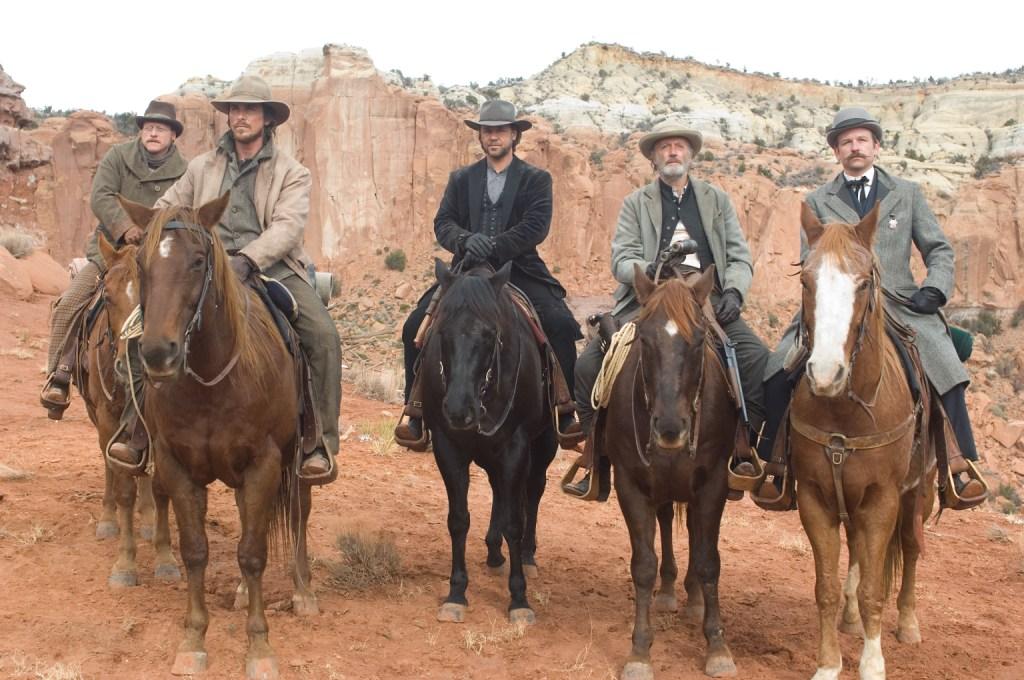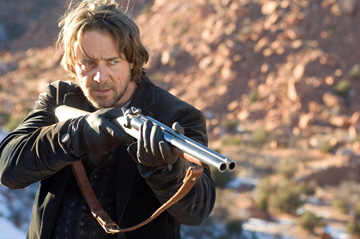“Since your testimony at the Committee’s hearing on July 26,2007, current and former
employees of the Office of Inspector General have contacted my staff with allegations that you
interfered with on-going investigations to protect the State Department and the White House
from political embarassment…The allegations made by these officials are not limited to a single unit or project within your office.” In a detailed and damning letter to the suspect, Henry Waxman’s House Committee on Oversight and Government Reform announces it is investigating attempts by the Dubya State Department’s Inspector General, one Howard J. Krongard, to shield the administration from political trouble. “One consistent element in these allegations is that you believe your foremost mission is to support the Bush Administration, especially with respect to Iraq and Afghanistan, rather than
act as an independent and objective check on waste, fraud, and abuse on behalf of U.S.
taxpayers.” Innocent until proven guilty, of course, but this sounds all too plausible, given what we’ve already seen from this bunch.
Month: September 2007
Indiana Jones and the Secret of the Loose-Lipped Edmontonian.
In a move sure to enrage the Lucas/Spielberg empire, a chatty extra spills the goods on Indiana Jones and the Kingdom of the Crystal Skull, including who the Big Bads are and how Marian Ravenwood (Karen Allen) will fit into the story. Oops.
Broadbent to Hogwarts.
Speaking of Indy IV, Dr. Jones’ new colleague, Jim Broadbent, is cast as professor and celeb hound Horace Slughorn for Harry Potter and the Half-Blood Prince. That works.
Events and Anniversaries.
A hearty congrats and best wishes to grad school friends Ben and Vivian (he of The Oak) on their nuptials this past Saturday at the scenic Brazilian Room in Tilden Park, high above Berkeley, California. (I was in attendance, but otherwise didn’t have much of a chance to take in the Bay Area this trip. I’ll be back soon, tho’, as Hiram Johnson and I still have some unfinished business.) Also, a very happy birthday to my mother, who turned 60 on Saturday. (And, really, what says “I love you, Mom” more than an alarm clock that speaks in the dulcet tones of Stephen Fry?) Finally — not that it’s anyone’s business, but it’s important to me — today marks the one-year anniversary of a crushingly bad break-up, after which it’s safe to say life took on a decidedly negative turn. But, hey, the earth has gone around the sun once more, I’m still standing, with my health and lil’ Berk in tow, and GitM lingers on. So, onward and upward…Now back to your regular fanboy musings and progressive diatribes.
Good Luck Chuck.
“I said after I was elected in 1996 that 12 years in the Senate would probably be enough. It is…I will not seek a third term in the United States Senate, nor do I intend to be a candidate for any office in 2008.” Senator Chuck Hagel (R-NE) announces his retirement, which may just mean a return to the Senate for Bob Kerrey. (So, he’s not running…I guess the trial balloon popped.) In any event, I thought Hagel maddeningly buckled to party pressure more often than not when the heat was on, and I still hold his attempted poison-pill amendment to McCain-Feingold back in 2000 against him. But, he also possessed a definite maverick streak on the war and a penchant for speaking-truth-to-power every so often that’ll be sorely missed on his side of the aisle. So, farewell, Senator Hagel, and please give yourself at least a few weeks off before commencing the fundraising for 2012.
Morning in Baghdad: The Petraeus and Crocker Show.
Declaring that “the military objectives of the surge are in large measure being met” (an assertion which rests, of course, on how one jukes the stats and skews the benchmarks), Army General David Petraeus, Dubya’s most recent man in Iraq, tells Congress he’s recommending a drawdown of troop levels in Iraq to pre-surge levels — around 130,000 troops — by July of next year. [Transcript.] Not a huge surprise — As Fred Kaplan noted both a few weeks ago and in his quality preview of today’s testimony, the Army would run out of troops by April anyway, so this was a foregone conclusion. Also, obviously, not what you’d call a real withdrawal (although the WP story’s cited experts suggest it may be taken as the “beginning of the end” by interested parties in Iraq…and Iran.) So, in effect, Petraeus punted to next July.
For his part, US Ambassador to Iraq Ryan Crocker backed Petraeus’ “Things are Getting Better” remarks in his own testimony, and intimated that the surge had staved off a near-total collapse. He also warned the nation about the nature of our continuing commitment there: “‘There will be no single moment in which we can claim victory,’ and any turning point will be recognized only ‘in retrospect.’“
Turning a Deaf Earmark.
“They are trying to change the whole vernacular so that earmarks aren’t earmarks anymore,” said Steve Ellis, vice president of Taxpayers for Common Sense.” (Or, put another way, “When there is a gap between one’s real and one’s declared aims, one turns as it were instinctively to long words and exhausted idioms, like a cuttlefish spurting out ink.“) Under the current Congress, it seems, “earmarks” have now become “congressionally directed spending” but, alas for real reform, the intent — to get pet projects into the public agenda by roundabout means — continues. “Members of Congress are now resorting to less obvious tactics that allow them to get money to favored beneficiaries without acknowledging support for what others consider to be earmarks…Government watchdog groups and a few dissident lawmakers have noticed these sleights of hand and have begun to complain. They say the approach deceives the public about how many special spending projects are being handed out, noting that lawmakers’ contacts with agencies usually are conducted out of public view.”
Slow Train Coming | How the West was Won (and where it got us).

Although the last act strains credulity quite a bit, James Mangold’s moody, memorable 3:10 to Yuma is nonetheless a worthy foray into the unforgiving territory of the Old West. I’ve never been much for oaters, to be honest, but if they keep making ’em like David Milch’s Deadwood and 3:10 (and, hopefully, The Assassination of Jesse James by the Coward Robert Ford in two weeks), I’m all for a full-fledged return of the cowboy pic. Then again, I guess it’d probably have been hard for 3:10 to falter in any event, with talented actors like Christian Bale, Russell Crowe, and others in the respective saddles. Mangold (showing more skill here than he did in Walk the Line) displays an authoritative sense of the genre here, and he doesn’t stint on the fireworks. But, for all the breathtaking “Big Sky Country” vistas and well-executed gunplay on display, the most exciting parts of 3:10 occur in the quiet moments between its two stars, as we watch Crowe (the Black Hat) attempt to wend and worm his way into what remains of (White Hat) Bale’s haunted psyche. With their dark interplay driving 3:10, not even the high suspension of disbelief required by the end, nor an overwrought father-son subplot, manage to derail this train. Come on aboard.
On the outskirts of Bisbee, in the years after the Civil War, an honest life is hard, as attested by the sad fate of one Dan Evans (Bale). Having lost his leg in the service of Abe Lincoln, Evans transplanted his wife (Gretchen Mol, dusty yet luminous) and two sons to the Arizona plains in search of renewal, only to find himself deeply in debt and on the verge of starvation. Dan’s boys, particularly his older son William (Logan Lerman), are humiliated by his failure and seeming weakness…and the rains just ain’t comin’. Meanwhile, the regal, courtly Ben Wade (Crowe), a part-time illustrator and full-time desperado, is living high on the hog, along with his gang of thieves, murderers, and bad, bad men — most notably his adoring #2 Charlie Prince (a.k.a. Ben Foster of Six Feet Under and Freaks & Geeks, strangely eerie and excellent here.) But, after a stagecoach job near Evans’ land, this Jack of Hearts lingers too long back in Bisbee, and is summarily captured by a mishmash of local law enforcement, bounty hunters on the Pinkerton payroll (i.e. a solid Peter Fonda, looking haggard and reminiscent of his dad), and Evans himself, in town to settle a debt one way or another. And, when the local railroad suit (Dallas Roberts) offers a $200 fee that might turn around his struggling fortunes, Evans enlists in the company assembled to take Ben Wade to Yuma Prison, by way of the 3:10 train in Contention. But — and it’s a big but — Wade’s gang is still at large, the forces of Law & Order are amateurish at best (note Firefly‘s Alan Tudyk as a well-meaning veterinarian conscripted into the group) and easily corruptible at worst, and Wade himself is no slouch in the survivability department. By means fair or foul, whether by quoting Scripture with a serpent’s tongue, bashing in a sleeping man’s head with a rock, or tempting Evans (and his son) with all the lucre and pleasurable squalor the ignoble life affords. Ben Wade will do what he must to restore his freedom…
…Or will he? My biggest problem with 3:10 to Yuma, and perhaps it’s also an issue in the Glenn Ford version of 1957 (I haven’t seen it), is that Ben Wade’s motivations grow increasingly confused as the film progresses. Given how easily he subdues certain people at certain times, one begins to wonder what’s keeping Crowe along for this ride, other than a general sense of bemusement about the whole proceedings. By the third act, which devolves into a town-wide shootout at the railroad crossing of Contention, it’s hard to figure exactly why Wade is behaving as he does (or, for that matter, why Evans’ missing leg isn’t a problem as he engages in the cowtown equivalent of Ninja Warrior.) Crowe is given a few lines at various points, and the final shot in the movie, to help explain his reasoning…and I guess it makes a certain amount of sense, from a dramatic perspective. But I’m not sure if I bought it, given all that’s come before.
Still, 3:10 to Yuma is another solid and welcome entrant in the burgeoning ranks of the revisionist western. (Indeed, the film reflects more of the New Western History than it does John Wayne country — For example, there’s a sequence involving evil Luke Wilson overseeing a Chinese railroad camp which is really kinda unnecessary, but I for one just liked seeing a Chinese railroad camp included in the proceedings.) And, as with The Wild Bunch, Unforgiven, and several other superlative entries in the genre, 3:10 frontlines the question of what code should — and actually does — govern a man’s actions when he is unconstrained by larger society.
Indeed, if you’ll permit me a digression, that was the beauty of Deadwood, a classic show still unsullied by Milch’s later, more confused attempt to fashion a Gospel of Surfing: Watching the varied, colorful residents of the town attempt to create a tentative order out of anarchic disorder: What rules must we live by if we are to live together? What should we do when the plague breaks out? How and when should the municipal government gather, who should attend, and what roles should it take on (and, for that matter, should there be canned peaches or cinnamon served at the meetings?) And, for the coup de grace, Milch offered a wry commentary on the iron fist within the velvet glove of the existing Gilded Age social order (and the ugly commercial realities that drove much of westward expansion.) When the fledgling entity of Deadwood finally ran up against the established authorities, it was not the government of these United States it faced, but rather the ruthless and mighty arm of unchecked Capital. By the end of Season 3, everyone — even the wily, formidable, and take-no-prisoners saloon proprietor Al Swearingen — was eventually forced to bow and succumb before the whims of the Great (and Monied) Man, George Hearst. (As Al put it, “Leviathan f**king smiles.”)
3:10 to Yuma doesn’t cover exactly the same ground as Deadwood, of course (and it has much less time to ruminate in any case.) But, at its heart, in the churning psychological tension between Crowe’s Wade and Bale’s Evans — as well as the omnipresent lure and power afforded by the almighty dollar therein — 3:10 ponders similar western verities. In the absence of external fetters, what drives a man to do the right thing, even to the point of ignoring his own self-preservation? In a world of complicated loyalties and compromising shades of grey, where the law is irrevocably bound up with the interests of the railroads and a struggling farmer and a smirking murderer can draw disparate conclusions from the same Bible, what, even, is the “right” thing in the first place? As today, different men come to different answers amid the open country of the Wild West. What probably matters most, 3:10 seems to suggest by the end, is that a man has some answer he’s ready to live — and die — by. As the cowboy troubador Alias once put it, “to live outside the law, you must be honest.” So you’d better do or find something to make your short time in Contention count…’cause no matter how you live your life, that slow train is coming up around the bend, and it ultimately waits for no one.

Crossfire, Hard-Wired?
Is political conflict bred in the bone (or, put less charitably, do some among us just have an easier time with higher-order thinking)? A new joint NYU-UCLA neurobiological study finds once again that left- and right-leaning brains function differently, with liberal minds more receptive to change than their conservative counterparts. “Dozens of previous studies have established a strong link between political persuasion and certain personality traits. Conservatives tend to crave order and structure in their lives, and are more consistent in the way they make decisions. Liberals, by contrast, show a higher tolerance for ambiguity and complexity, and adapt more easily to unexpected circumstances…[In this case] respondents who had described themselves as liberals showed ‘significantly greater conflict-related neural activity’ when the hypothetical situation called for an unscheduled break in routine. Conservatives, however, were less flexible, refusing to deviate from old habits ‘despite signals that this…should be changed.’”
But in time you see things clear and stark.
In Marvel news, the the teaser for Jon Favreau’s take on Iron Man, with Robert Downey, Jr., Gwyneth Paltrow, Terrence Howard, and Jeff Bridges, is now officially online. (Basically, it’s a shortened version of the Comicon clip.) And has Matthew Vaughn found his Thor in Kevin McKidd of HBO’s Rome and Trainspotting? Possibly maybe…if so, that’s not half-bad.

